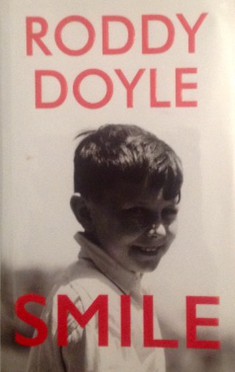Inspiring Older Readers
 posted on 15 Feb 2018
posted on 15 Feb 2018
Smile by Roddy Doyle
This is a great title because just picking up a book by Roddy Doyle always brings a smile to my face as he is such a reliably good sort to spend time with. All his novels have their share of bleakness and angst but somehow the sharp humour and authentic dialogue makes them a pleasure to read – no matter how dark the subject matter.
This one is a good example as beneath the tale of Victor, a fifty four year old man trying to come to terms with living apart from his wife and son and hoping to refresh his view of the world, it has an underlying theme of the shocking child abuse carried out by the Christian Brothers in Ireland. Victor has buried the memory of his own personal experience pretty successfully until it is disturbed by a chance meeting in his new local pub with someone who claims to remember him from school. At least he thinks it is a chance meeting but the very unpleasant character, Fitzpatrick begins to infect his otherwise hum drum life and in the process, makes him reassess everything he thought he remembered about his childhood.
Nevertheless, this is no misery memoir because Doyle succeeds in taking us back to his schooldays with his idiosyncratically frank and very funny voice. He conjures up the memory of himself as a boy who, together with his classmates, wages a cartoonish war against the adults who are trying to knock a particular kind of traditional education into them. In fact I kept getting an image of The Bash Street Kids from the Beano come to mind as the children endure the savage regime of beatings, sarcasm and worse. Due to an incident where one of the teachers, Brother Murphy, pays fourteen year old Victor just a bit too much attention in class, the other boys swoop viciously in the playground and call him ‘the Queer’, a dreaded nickname that blights the first three years of his schooldays.
We learn a lot about Victor and his former wife as he reflects on his past life. He used to be a music journalist trailing round live gigs in Dublin which allows many musical and other cultural references to shine throughout the novel. His early success gives him the confidence to abandon writing his third year dissertation and to plunge headlong into being a full time writer. But in his heart he knows that he is a charlatan and has a lot of guilt about lazily whiling away his life when he had always been raised to respect the importance of hard work. For a while he is a small time journalist and remembers fondly that his mother was at first fiercely proud of him: ‘Her son had a job. A real job she could bring to the shops’. That is until he writes about a politician who has had an abortion and then she is not so pleased. His ex- wife Rachel, who is now a celebrity TV cook, sees right through him from the start of their relationship but is always kind and supportive, even when his long awaited novel never appears. I love the way that he captures the joy and hope of their early happier times together when she visits him in his bedsit and cooks for him:
‘I was eating a thing called couscous and there were no peas or spuds on the plate, or meat. I was doing this as I sat beside a naked woman. There was a mug of wine on the floor beside me. I felt French. I felt American. I felt like a writer living the writer’s life. I felt handsome. I felt cruel and good, adult and giddy. I felt sophisticated, and I didn’t. I felt that this was mine. My life had started. My real life had started’.
So why does Victor endure the attentions of the odious Fitzpatrick and why does he keep seeking him out? If he is so obnoxious why on earth doesn’t he start drinking in a different place? The answer seems to be that he is repelled yet fascinated by Fitzpatrick and everything he represents. On the one hand he is a loutish slob but at the same time he has an easy camaraderie that Victor envies. His life with Rachel has made him an outsider with his old school mates and even when in his twenties, he remembers craving to being able to spend time sharing banter with them. But now she is famous he has an uncomfortable mixture of pride and embarrassment when Fitzpatrick and other men in the pub talk about her as if she were common property. He realises that he needs to relearn a love of football and rugby so that he can slot into the conversation more easily and also try hard to flirt with women again.
I won’t spoil the story by telling you what eventually happens between him and Fitzpatrick, but it turns out that they have a lot more in common than Victor originally realised. Part of Roddy Doyle’s skill is to take you places you don’t think you’re going or perhaps don’t want to go. And he does this by teasing you along with humour and with creating a world people with characters you recognise or feel comfortable with. Having laid the traps he leads you into them and you follow willingly. This is vintage stuff from Doyle. At the moment I think the book is still only available in hardback but I would guess a paperback isn’t far away.
Karen Argent
February 2018